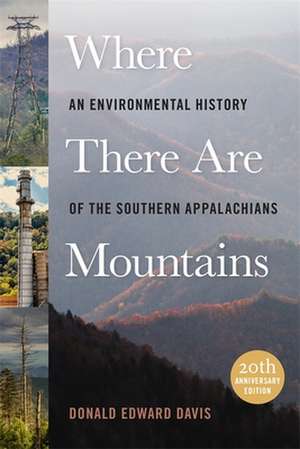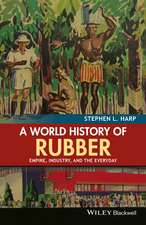Where There Are Mountains
Autor Donald Edward Davisen Limba Engleză Paperback – oct 2020
Donald Edward Davis discusses the degradation of the southern Appalachians on a number of levels, from the general effects of settlement and industry to the extinction of the American chestnut due to blight and logging in the early 1900s. This portrait of environmental destruction is echoed by the human struggle to survive in one of our nation's poorest areas. The farming, livestock raising, dam building, and pearl and logging industries that have gradually destroyed this region have also been the livelihood of the Appalachian people. The author explores the sometimes conflicting needs of humans and nature in the mountains while presenting impressive and comprehensive research on the increasingly threatened environment of the southern Appalachians.
| Toate formatele și edițiile | Preț | Express |
|---|---|---|
| Paperback (2) | 221.06 lei 6-8 săpt. | |
| University of Georgia Press – 28 feb 2003 | 221.06 lei 6-8 săpt. | |
| University of Georgia Press – oct 2020 | 224.21 lei 6-8 săpt. |
Preț: 224.21 lei
Nou
Puncte Express: 336
Preț estimativ în valută:
42.90€ • 46.75$ • 36.15£
42.90€ • 46.75$ • 36.15£
Carte tipărită la comandă
Livrare economică 23 aprilie-07 mai
Preluare comenzi: 021 569.72.76
Specificații
ISBN-13: 9780820358383
ISBN-10: 082035838X
Pagini: 364
Dimensiuni: 152 x 229 x 21 mm
Greutate: 0.44 kg
Editura: University of Georgia Press
ISBN-10: 082035838X
Pagini: 364
Dimensiuni: 152 x 229 x 21 mm
Greutate: 0.44 kg
Editura: University of Georgia Press
Notă biografică
DONALD EDWARD DAVIS is an independent scholar, author, and former Fulbright fellow. He has authored or edited seven books, including Southern United States: An Environmental History. His second book, Where There Are Mountains: An Environmental History of the Southern Appalachians, won the prestigious Philip D. Reed Environmental Writing Award. Davis was also the founding member of the Georgia Chapter of the American Chestnut Foundation, serving as its president from 2005 to 2006. He is currently employed by the Harvard Forest as a part-time research scholar and lives in Washington, D.C.









